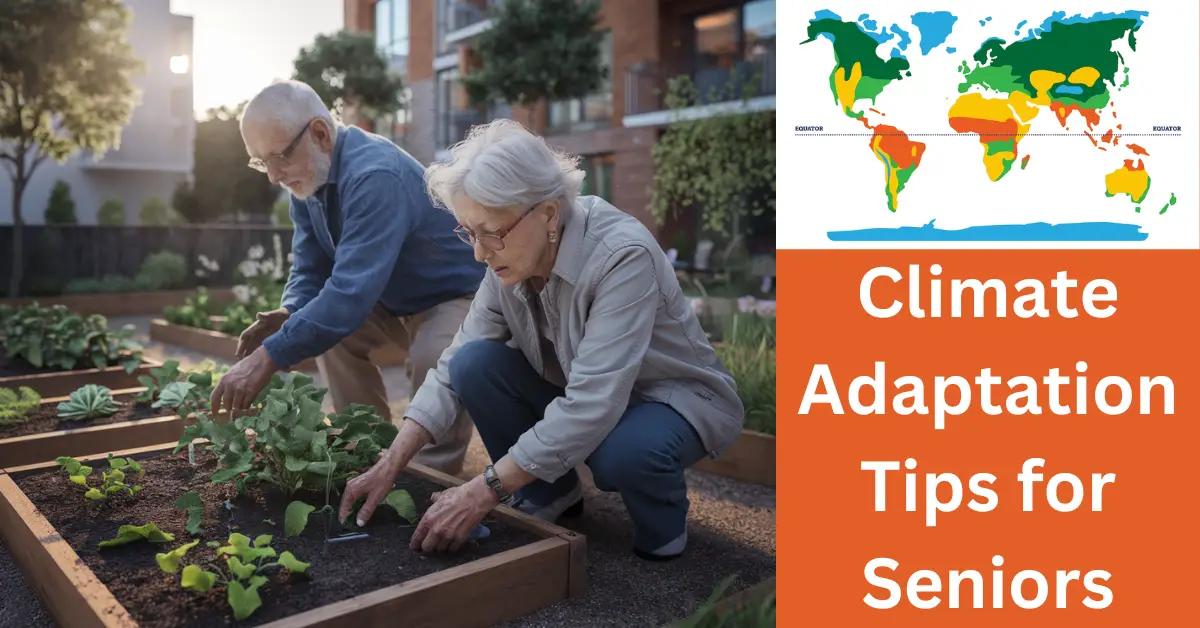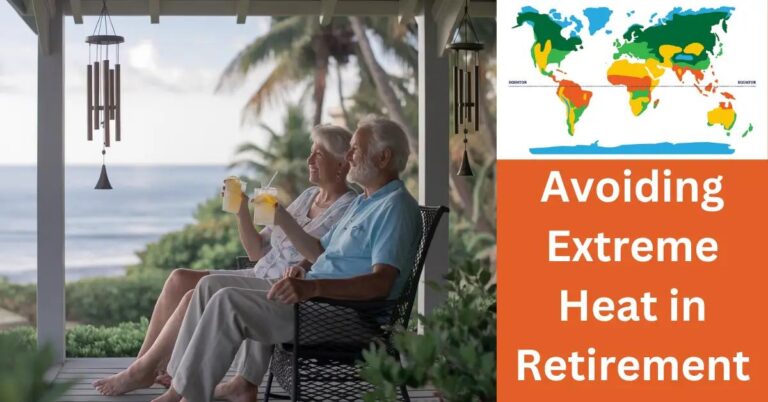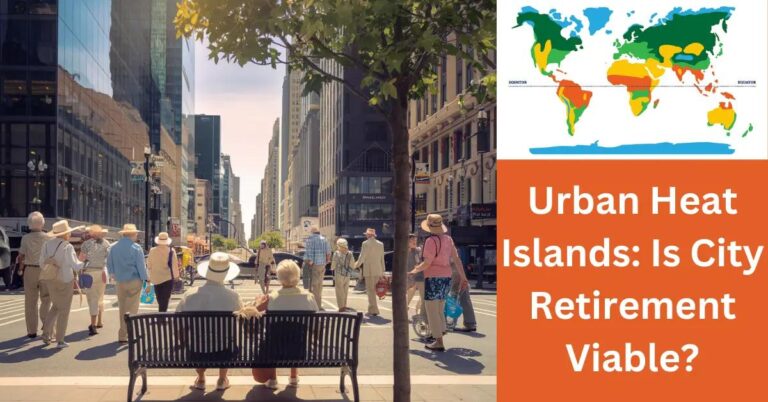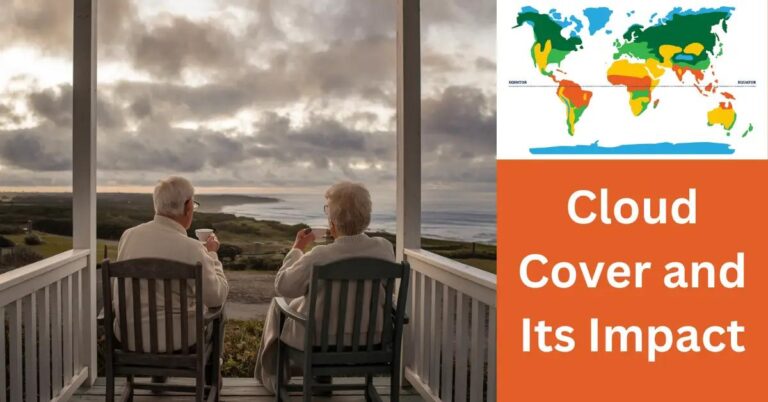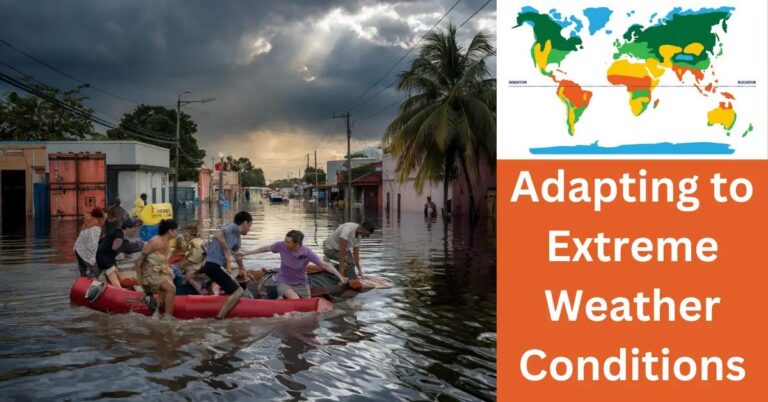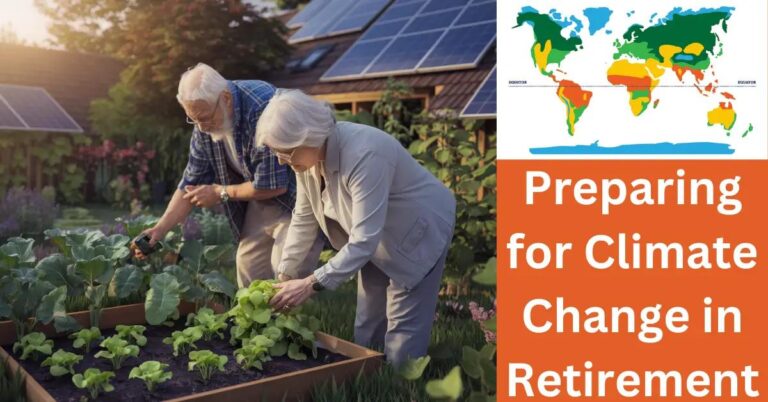TL;DR:
- Elderly are vulnerable to heatwaves; dehydration and heat stroke are risks.
- Safety tactics: Plan for heatwaves, have a cool place, use shades and fans, and stay hydrated.
- Affordable cooling solutions: Energy-efficient appliances, portable air conditioners, window fans, and smart thermostats.
- Improve indoor air quality with purifiers and plants; wear light, loose clothing.
- Emergency kits: Include water, food, flashlight, radio, batteries, first aid, medications, and important documents.
- Reduce climate impact by using less plastic, planting trees, saving energy, using public transport, and reducing meat consumption.
- Seniors should join community groups and advocate for climate action and policy changes.
- Mental health support, social connections, and access to healthcare are crucial during extreme weather.
Seniors face unique challenges as climate change heats up the world. Older adults are more sensitive to high temperatures, making it vital to know heatwave safety tactics. In this guide, I'll share tips to keep seniors safe and cool. From hydration tips to senior-friendly cooling systems, learn how to create a climate-resilient home. Let's ensure every senior can enjoy a safe and cool summer!
Heatwave Safety for Elderly
Older adults can be some of the most affected by climate change. They may face unique challenges due to age-related health conditions. Heat sensitivity is common among seniors, making them more vulnerable during heatwaves. A simple jump in temperature can cause health issues like dehydration or heat stroke.
To keep older adults safe, we need to talk about some important tactics. First, prepare for heat by having a plan. Make sure you know when heatwaves are coming and have a go-to cool place. Check on our senior friends often. Let them know how important it is to stay cool.
Creating a heat-resilient environment also matters a lot. Shades and curtains can block the sun. If it’s cooler, this makes it simpler to keep healthy. Using fans or air conditioners is great too. Some folks might worry about the cost. Keep in mind that local help may exist, where assistance is provided to those who can't cool down their homes.
Hydration is essential during heatwaves. Older bodies may take longer to realize they're thirsty. Keep water nearby and remind seniors to drink plenty. Every sip counts. Going without can lead to dehydration quickly.
For seniors, having accessible cooling technologies can be a lifesaver. Items like handheld fans or cooling towels help keep body temperature down. Think about using room coolers. They don’t take much power and work great in small spaces.
Remember, being ready can make all the difference. If you plan ahead, seniors can beat the heat one day at a time.
Senior-Friendly Cooling Techniques
Living through hot months can be tough for seniors. This is why I've gathered some senior-friendly cooling techniques that are both smart and efficient.
One great way to keep the house cool is by using energy-efficient appliances. These appliances save energy and help keep cool indoor air without using too much power. Also, energy-efficient devices are often quieter, which makes for a peaceful home.
Let's explore different home cooling systems. There are affordable and effective ways to stay comfortable. Have you thought about portable air conditioners or window fans? These options can cool a room quickly and are often less pricey than a central cooling system.
Now, let's talk about what to wear. It's crucial to select the right clothes during heatwaves. Wearing light-colored and loose-fitting clothes can help keep you cooler. Natural fabrics like cotton allow the skin to breathe, making you feel more comfortable.
Another way to manage the home temperature is with smart thermostats. These smart gadgets help with better temperature control by learning your habits and adjusting the indoor climate. They make sure your home stays at a pleasant temperature while saving electricity.
Indoor air quality should not be overlooked. Excellent air quality ensures more comfort and can prevent health problems, especially when it's hot. Simple actions like using air purifiers or plants that filter air can keep your home fresh.
Being prepared is important for seniors facing climate change. So, what are the four adaptation strategies for climate change? First, use energy-efficient devices. Second, consider affordable cooling systems. Third, dress right for the season. Fourth, control home temperatures effectively. These strategies are simple but ensure your environment remains comfortable and healthy.
For more information and smart tips, visit this webpage. This page provides additional advice on keeping your home energy-efficient and comfortable during hot months.
Emergency Kits for Senior Citizens
Let's equip ourselves with senior emergency kits for climate challenges. These kits keep us safe during disasters. First, gather water and non-perishable food for three days. Add a flashlight, portable radio, and extra batteries for power outages. A first aid kit is a must, along with copies of important documents.
What are five things to reduce climate change? Use less plastic, plant trees, save energy at home, use public transport, and reduce meat consumption. These steps help us protect our environment and lessen climate impact.
Include medications with clear labels. It makes access during a crisis simple. Stow spare hearing aids or glasses if needed. Don't forget to pack medical devices like blood pressure monitors. Keeping these close ensures health needs remain addressed.
Stock reusable, earth-friendly items in your kit to help our planet. Refillable water bottles and cloth bags cut down on waste. Even in emergencies, we can minimize our impact.
Seniors, stay informed with a solid communication plan. Discuss with family members, and keep their contact details handy. Know local emergency alerts and how to access them. Stay connected to resources that provide timely updates.
Do older people care about climate change? Many think climate change lacks urgency or feels overwhelming. Provide approachable solutions and highlight the importance of personal actions.
Now let's see how age-friendly technology alerts us without overwhelming. Devices with large screens and clear displays make receiving alerts easy. These tools help maintain connection to vital information. Smart speakers can announce warnings, ensuring you stay ready in emergencies.
Remember, keeping a clear head and a prepared kit makes a big difference. It can turn crisis into calm. Let's equip ourselves wisely and lead by example. After all, protecting ourselves means we're also protecting our communities.
Preparing the Elderly for Extreme Weather
Where is the best place to retire for climate change? The best places have mild weather, good services, and community support. Seniors should look for locations with fewer extreme weather events like hurricanes or heatwaves. Areas with a strong local government that plans for climate change are ideal. Importantly, there should be good access to healthcare facilities and emergency services.
To build neighborhood resilience, seniors can join or start community groups. These groups work together to make plans for emergencies. Sharing resources and information makes everyone safer. Getting to know your neighbors, like when you check on each other during bad weather, builds a strong safety net.
Seniors play a crucial role in climate action and advocacy. Participating in local meetings and talking to leaders about senior concerns makes a difference. Outreach campaigns make people aware of how climate affects older adults. This action leads to better policies that protect everyone.
Access to healthcare is vital in emergencies. Seniors need to ensure that they can reach a doctor or a clinic quickly. Find out which healthcare services are available during storms or heatwaves. Keep important health records in a safe place.
Mental health is just as important as physical health. Extreme weather can cause stress and anxiety in seniors. Joining a support group offers a space to talk and share feelings. Techniques like deep breathing and meditation ease stress. Staying connected with family and friends also helps keep spirits high.
By planning and preparing for extreme weather, seniors can live safely and comfortably. Knowing which areas have safer climates, connecting with neighbors, and advocating for better policies makes a big impact. Remember, staying informed and involved strengthens resilience against climate challenges.
Conclusion
Short recap: We've explored how to keep seniors safe during heatwaves by recognizing their heat sensitivity, preparing effectively, ensuring hydration, and creating cool spaces. We discussed cooling options like energy-efficient gadgets and suitable clothing. Also, we covered emergency kits packed with essentials and communication strategies.
Final thoughts: Climate change impacts seniors deeply. By preparing properly, we ensure their safety and comfort. Together, let's build a world where seniors thrive, even in the face of extreme weather. Adjust, prepare, and protect our elderly loved ones.

